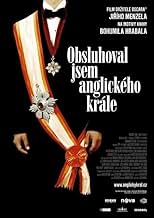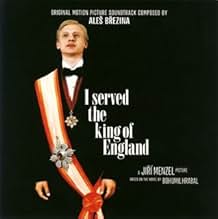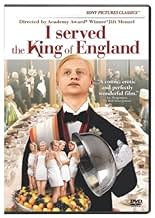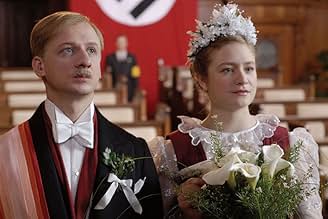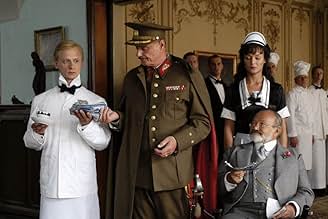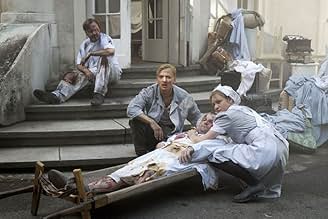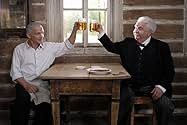IMDb रेटिंग
7.3/10
8.3 हज़ार
आपकी रेटिंग
अपनी भाषा में प्लॉट जोड़ेंA look at the glamorous life at an old-world Prague hotel.A look at the glamorous life at an old-world Prague hotel.A look at the glamorous life at an old-world Prague hotel.
- पुरस्कार
- 12 जीत और कुल 13 नामांकन
कहानी
क्या आपको पता है
- ट्रिवियाThe scenes for the Hotel Pariz restaurant were filmed in the main restaurant in Prague's Obecni Dum (Civic House), just around the corner from the actual Hotel Pariz. Both restaurants were designed in the Art Nouveau style by artist Alphons Mucha, but the Obecni Dum restaurant is larger.
- गूफ़Jan sees a train full of people being deported to a concentration camp. A closeup of one of the cars shows men within wearing gray and white striped uniforms. However, deportees were sent to the camps wearing their civilian clothes and weren't issued uniforms until after they arrived.
- भाव
Jan Díte, older: A person becomes most human, often against his own will, when he begins to founder, when he is derailed and deprived of order.
- कनेक्शनEdited into CzechMate: In Search of Jirí Menzel (2018)
फीचर्ड रिव्यू
Menzel, faithful to Hrabal, shows the Fall of Czech Man - and Sudeten German Woman - and their expulsion from their respective Middle-European idylls: They tragically fall into each other's arms just as global issue is joined that soon disillusions our Romeo and destroys his (now unfortunately rampantly Nazi) Juliet.
Neither the quiet life of getting rich and enjoying all the pleasures money can bring, nor the stirring Wagnerian strains of Germanic supremacist idealism, can survive, but our opportunistic anti-hero, Ditie (a name which can translate as 'little man') is more adaptable, because his ideals are more pliant to the accidents of fate than his German wife's rigid Hitlerite fanaticism, and consequently he is eventually able to emerge from a sort of Communist Purgatory with a keen appreciation of life's real and much simpler necessities.
With profound irony, it is in a smashed and ethnically cleansed Sudeten German village that an older and a wiser Ditie's rehabilitation is completed. And it is from this sobering perspective that he can finally both regret the excesses and errors of his life, and yet also take nostalgic pleasure from what was, after all, the wonderful, glittering, profoundly human spectacle of folly and grandeur which his life has been! Far from tragic or depressing, therefore, this film of the 20th century debacle of a nation ruined remarkably concludes with a very Czech endorsement of the simple, inoffensive pleasure in life which will always console this patient people at the troubled heart of darkest Europe: Ditie allows himself to enjoy a tankard of Pilsener beer - and Menzel's camera seems to gild the moment with as much gloriously sensuous golden dreaminess and spiritual fulfillment as ever bloated millionaire or romantically excessive idealist knew.
At last, the little man has found his fulfillment where it always lay: in the little things. At last, old, disillusioned and unseduced any longer by the world's headier attractions, Ditie finds himself at home and happy.
Here, the film seems to be saying, is the real idyll to which the Czech person should retire for refreshment of the soul, and not those false - though fabulous - ones we have been forced to discard.
Just as Ditie observes that his own career of accidents always turned out well, so in this perspective the Czech experience seems, on the whole, to have turned out for the best. This optimistic fatalism seems typical of the Czech way of seeing things, and is as characteristic of this film of Menzel's old age as it was of his early masterpiece, 'Closely observed trains.' On this view, it would be churlish to condemn the film for self-indulgence, as many Western critics have done. Frankly, they haven't suffered so much, so what do they know of ethical conundrums and the moral paradoxes of survival? This meditation on the more inglorious struggles of the insignificant and friendless to survive deserves our respect, not an easy and priggish contempt. This must especially be true in the country which lies behind the heavily loaded title 'I served the King of England,' for this heavy hint must surely prick that particular national conscience with its role in one of history's most blatant acts of betrayal. The title practically dares any English commentator to judge Ditie in his historical predicament!
(There is also considerable satisfaction to be had by the viewer from the sheer technical finesse of the film's production, on every level. Jiri Menzel's craft is also hugely impressive in scene after scene, which are turned with complete mastery of tragi-comic effect. But this is a study for another occasion.)
Neither the quiet life of getting rich and enjoying all the pleasures money can bring, nor the stirring Wagnerian strains of Germanic supremacist idealism, can survive, but our opportunistic anti-hero, Ditie (a name which can translate as 'little man') is more adaptable, because his ideals are more pliant to the accidents of fate than his German wife's rigid Hitlerite fanaticism, and consequently he is eventually able to emerge from a sort of Communist Purgatory with a keen appreciation of life's real and much simpler necessities.
With profound irony, it is in a smashed and ethnically cleansed Sudeten German village that an older and a wiser Ditie's rehabilitation is completed. And it is from this sobering perspective that he can finally both regret the excesses and errors of his life, and yet also take nostalgic pleasure from what was, after all, the wonderful, glittering, profoundly human spectacle of folly and grandeur which his life has been! Far from tragic or depressing, therefore, this film of the 20th century debacle of a nation ruined remarkably concludes with a very Czech endorsement of the simple, inoffensive pleasure in life which will always console this patient people at the troubled heart of darkest Europe: Ditie allows himself to enjoy a tankard of Pilsener beer - and Menzel's camera seems to gild the moment with as much gloriously sensuous golden dreaminess and spiritual fulfillment as ever bloated millionaire or romantically excessive idealist knew.
At last, the little man has found his fulfillment where it always lay: in the little things. At last, old, disillusioned and unseduced any longer by the world's headier attractions, Ditie finds himself at home and happy.
Here, the film seems to be saying, is the real idyll to which the Czech person should retire for refreshment of the soul, and not those false - though fabulous - ones we have been forced to discard.
Just as Ditie observes that his own career of accidents always turned out well, so in this perspective the Czech experience seems, on the whole, to have turned out for the best. This optimistic fatalism seems typical of the Czech way of seeing things, and is as characteristic of this film of Menzel's old age as it was of his early masterpiece, 'Closely observed trains.' On this view, it would be churlish to condemn the film for self-indulgence, as many Western critics have done. Frankly, they haven't suffered so much, so what do they know of ethical conundrums and the moral paradoxes of survival? This meditation on the more inglorious struggles of the insignificant and friendless to survive deserves our respect, not an easy and priggish contempt. This must especially be true in the country which lies behind the heavily loaded title 'I served the King of England,' for this heavy hint must surely prick that particular national conscience with its role in one of history's most blatant acts of betrayal. The title practically dares any English commentator to judge Ditie in his historical predicament!
(There is also considerable satisfaction to be had by the viewer from the sheer technical finesse of the film's production, on every level. Jiri Menzel's craft is also hugely impressive in scene after scene, which are turned with complete mastery of tragi-comic effect. But this is a study for another occasion.)
- philipdavies
- 6 अग॰ 2008
- परमालिंक
टॉप पसंद
रेटिंग देने के लिए साइन-इन करें और वैयक्तिकृत सुझावों के लिए वॉचलिस्ट करें
- How long is I Served the King of England?Alexa द्वारा संचालित
विवरण
- रिलीज़ की तारीख़
- कंट्री ऑफ़ ओरिजिन
- आधिकारिक साइटें
- भाषाएं
- इस रूप में भी जाना जाता है
- I Served the King of England
- फ़िल्माने की जगहें
- उत्पादन कंपनियां
- IMDbPro पर और कंपनी क्रेडिट देखें
बॉक्स ऑफ़िस
- बजट
- CZK 8,44,50,000(अनुमानित)
- US और कनाडा में सकल
- $6,17,403
- US और कनाडा में पहले सप्ताह में कुल कमाई
- $53,218
- 31 अग॰ 2008
- दुनिया भर में सकल
- $73,54,478
- चलने की अवधि1 घंटा 53 मिनट
- रंग
- ध्वनि मिश्रण
- पक्ष अनुपात
- 1.85 : 1
इस पेज में योगदान दें
किसी बदलाव का सुझाव दें या अनुपलब्ध कॉन्टेंट जोड़ें

टॉप गैप
By what name was Obsluhoval jsem anglického krále (2006) officially released in Canada in English?
जवाब

